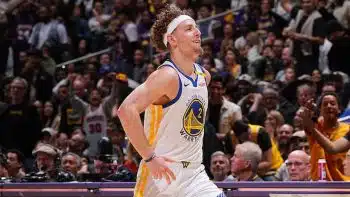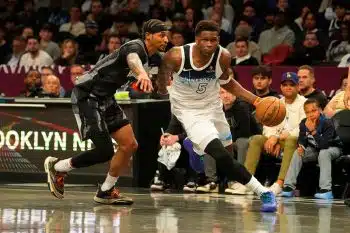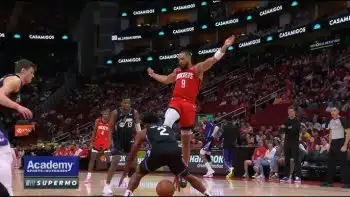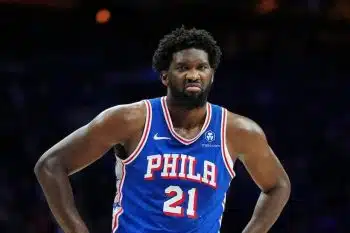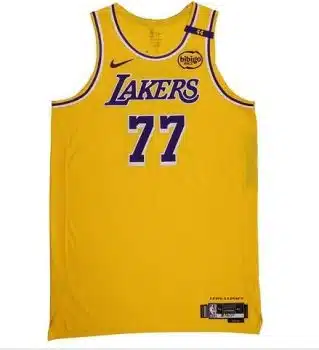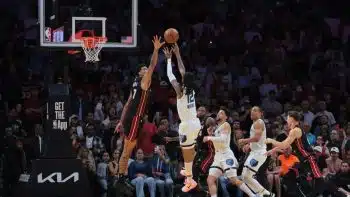NBA
Russell On Consistency, Leadership, Lakers’ Future
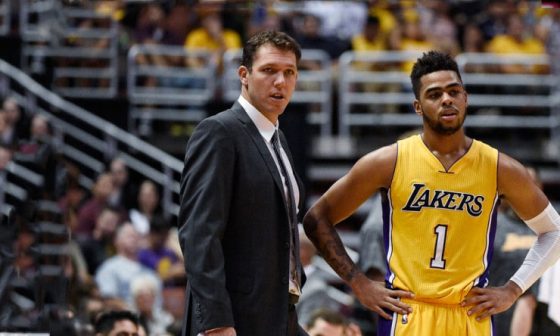
Fresh off the L.A. Lakers’ first loss of the season, D’Angelo Russell is the final player to dress and speak with assembled media. Powered by his heroics, the Lakers had shocked some people a couple nights prior with a win over the Houston Rockets to open the year, but they – and he – ran out of gas on this night against a more disciplined Utah Jazz team.
Russell’s first question is on progression in his individual game from last year to this one; he talks instead about how much better certain areas of the game felt for the team as a whole, even in a loss. He carries it well, but Russell is clearly throwing himself head-first into a leadership void left over from a strange culture last season. Most young guys say the right things, but Russell has a unique way of sounding older as he’s saying them. This is a 20-year-old already without a hint of doubt about the level of expectations on him. Not just today – every day for as long as he can imagine. Not just on the court, but off it as well.
Russell wears a hoodie with the words “I Ain’t Dead Yet” in bright contrast over the heart. He laughs off the idea that it’s a representation of his larger mentality – “No, I talk to you guys with that kind of mentality,” he jokes to reporters, before saying the hoodie is from a fan’s new clothing line he’s supporting – but the metaphor feels pretty appropriate.
No second overall pick has it easy as a teenager in the NBA, but few encounter quite the whirlwind of circumstances Russell dealt with as a rookie last season either. After all, he was the first top-five draft pick made by the Lakers since James Worthy over 30 years ago. Russell entered a locker room warped by the presence of soon-retiring superstar Kobe Bryant, and torpedoed by head coach Byron Scott’s desire to cater to Bryant over developing the first true franchise rebuild in decades.
Russell spent time in Scott’s doghouse, and the relationship appeared rocky at points (both have taken public shots at each other since Scott was fired). He struggled with Bryant’s role, both in the locker room and on the court. He was involved in a highly-publicized off-court incident with Nick Young, one that only became as much due to an obsessive macho man culture within sports. With months to reflect, Russell said he “didn’t get nothing out of” his first NBA season.
Can anyone blame the guy for flipping the page to his sophomore season in a hurry, searching for a more positive script?
“You can’t really give that leadership quality to anybody, or that role to anybody,” Russell said. “It’s just gotta be a team thing. It slowly just builds on players. For me, I know that when adversity sets in, I just try to respond the right way.”
To hear it from elder statesmen in the locker room, he’s already making strides here.
“I couldn’t imagine being 19, 20 years old with so much responsibility on your shoulders,” Lakers veteran Lou Williams said. “I think he’s handled it well, with a lot of grace.”
New bench boss Luke Walton saw Russell from a different perspective last season. He wasn’t in Lakers practice or shootarounds; his experience with his future point guard was limited to in-game play, which was a bit of an incomplete picture for reasons already noted.
When he first saw him up close and behind the scenes, though, Walton wasn’t quite prepared.
“He can get in the post, he’s really good at scoring down on the block, he can shoot threes,” Walton said, listing off skills one by one. “He kind of has that James Harden ability to keep guys on his back and hit midrange jumpers. So his overall ability to score has been a bit of a surprise.”
Within the same answer, though, Walton addressed gaps he still found present after a year of stunted development.
“For him, it’s finding that line of getting the teammates involved from the point guard position [versus] scoring the ball,” Walton said. “In scouting [him last year], you see him have big shooting nights and then poor shooting nights.”
That’s really just consistency Walton is talking about, and it’s the biggest theme you run into when asking around the team about their ascendant second-year point guard. Williams mentioned “playing through adversity” as the biggest challenge for a young player; Russell himself hit these same talking points, though again through a team scope rather than individual.
As someone who’s been through it all from start to finish, though, Walton may have had the best perspective.
“To me, consistency – whether as an individual or a team – is one of the hardest things to deal with in the NBA as a young person or a young team, because of the amount of games we play,” Walton said. “I mean, you come out here and the amount of stress and pressure that is on you every single night, three or four times a week, it’s draining. And it’s hard on young guys. The older you get, you start to realize how to handle that, and that’s when you become more consistent.”
On the court, it starts with consistency in habits. A pick-and-roll in October needs to be run with the same precision and force as a pick-and-roll in a vital April game. Skills can only begin to layer on top of each other and form into a complete game when the foundation is solid.
For a guy who already entered the league with so much raw skill and feel for the game, though, the theme has often manifested itself in Russell’s decision-making. Walton mentioned that elusive balance between scoring and facilitating for a player with Russell’s prodigious ability to fill it up, one certain to be an ongoing process as other core pieces mature right alongside him. Shot selection is a primary talking point.
“If Russell’s open, I’m fine with him shooting the shot,” Walton said. “If it’s just come down, nobody else touches the ball, he takes a contested three, that’s a bad shot. And that’s what we need to stay away from.”
Russell’s role has expanded dramatically – he’s using over 29 percent of Lakers possessions while on the floor, way up from 24 percent last year. He’s running more pick-and-roll as the primary option, upping his percentage of team baskets assisted without (yet) showing any increase in turnover rate. There have been bumps in this road (Russell is shooting just 33 percent on the year, for instance), and there will be more. This is never a painless process for a player so young, especially one entrusted with so much offensive responsibility.
Gauge the feel around the room, though, and it seems like consistency off the court has been just as big a deal for Russell and the rest of the core. The franchise brought in veterans like Timofey Mozgov, Luol Deng and Lou Williams (last summer) in part to lend new voices here – “He’s sprinkling that knowledge on me,” Russell said of Deng.
“We’re all within two or three years of each other, obviously same age group, enjoy doing the same type of thing,” Larry Nance, Jr. said of a core group that now includes himself, Russell, Julius Randle, Jordan Clarkson and Brandon Ingram. “There’s definitely some camaraderie building, and there’s a team atmosphere forming.”
Russell’s fanfare has been most intense among this group, starting with his generationally unprecedented draft slot within the league’s most storied franchise and, perhaps, intensifying during last season’s tabloid silliness. His Twitter following dwarfs all the other members of the core outside Randle (in large part due to his Kentucky fans). But inside the locker room walls, that noise is drowned out.
When asked about the spotlight being brighter on Russell, Nance Jr. seems surprised by the suggestion.
“Even you asking that question, I was like, ‘Wait, really?’ At least to me, to all of us I think, we all are one,” Nance Jr. said. “We’re all equals, and no one’s better than the other. We’re all just playing for the end goal of winning.”
In many ways, Russell’s search for consistency in all aspects of the game is the perfect microcosm for the franchise as a whole. This is uncharted territory for everyone. Russell has spent most of his basketball career dominating with ease at every level; the Lakers hadn’t picked a guy so high in the draft for three decades because they never had to. Unique challenges lie ahead.
Russell is ready for these and more. He seems to view his pitfalls with as much excitement as his successes – a chance to learn is more useful than a task he’s already mastered, after all. D’Angelo ain’t dead yet; he’s only begun to come alive.
